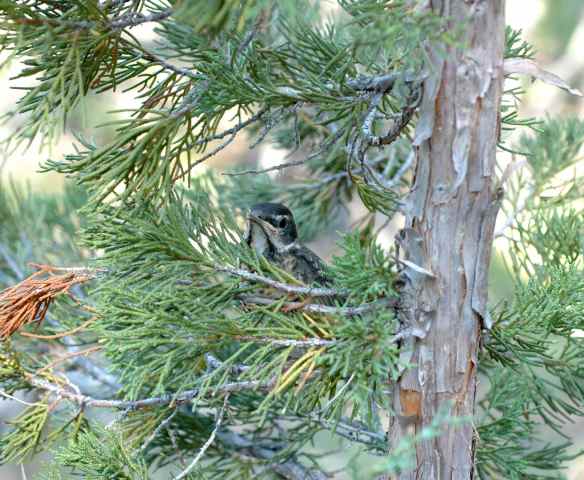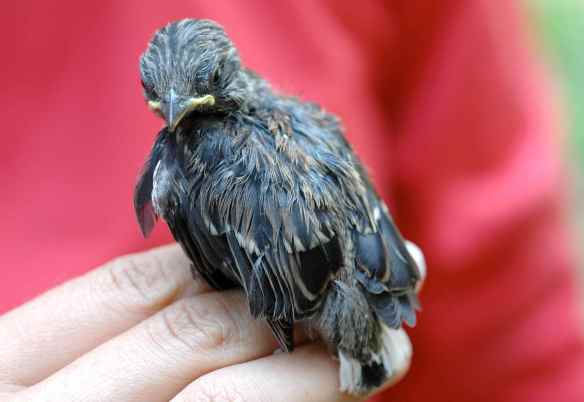Lol Pet Live Stuck Making Feeding Noise
EDIT 5/26/2016: If you found this post because you have a baby bird and are wondering what to do with it, please see this post instead; it will be more useful.
———————————————
Being a fledgling—a chick that has left the nest—is awkward.

Junco fledgling MAII illustrates the awkwardness via interpretive dance.
Fledglings are at one of the most dangerous time in their lives, facing an average mortality rate of 42% over just a week or two. Most of that mortality happens early, just after the little guys have left the nest. New fledglings have almost no skills: they can't feed themselves, can't fly well (or, in many cases, at all) and can't do anything to defend themselves if something terrifying like a weasel, snake, crow, or even chipmunk decides to eat them.
So why do they fledge at all? Because staying in the nest would be even more dangerous. A flightless baby bird's chief defense is being hidden, and a nest, while it is often hidden, has disadvantages. After two weeks of the parents feeding their chicks, there is a lot of evidence around indicating where the nest is: the nest will smell like bird; the parents will be in the area noticeably frequently; and if an intelligent predator like a Steller's Jay gets the idea to watch parental movement, it will quickly learn where the nest is. A baby bird out of the nest can do better, as long as it is capable of running and perching, since it can change hiding places and can hide separately from its siblings.

Young junco fledgling hiding. Photo by Jeremy Spool.
Young fledglings tend to place all their hope in remaining unseen. Two young American Robins I encountered recently remained motionless even when I stuck a camera lens within inches of them, stoically hoping that I would believe that they were statues and go away.

American Robin fledgling
When I picked up one of them, it called for a moment, then reverted to its motionless act… in my hand.

Me with a different American Robin fledgling

You can't see me!
This seems silly, but it's really the only strategy fledglings have before they can run fast or fly. Still, the robin seems to be extreme; fledgling juncos will not sit in your hand unrestrained.

ABEE: As soon as she lets go, I'm outta here.
Fortunately, fledglings—well, the ones who survive—outgrow this helplessness pretty quickly. Once they can fly, they are much safer, and their challenge becomes learning how to be a self-sufficient bird. I've written before about how fledglings learn to catch food, and it's not a trivial matter: most mortality in young fledglings comes from predation, but in older fledglings, there is evidence for a second peak of mortality due to starvation.
But it isn't enough to simply stay alive: fledglings have to turn into successful adult birds. So even while they're hiding from predators and perfecting their foraging technique, they may also have to be learning their species' song, noticing what a good breeding territory looks like, and forming social relationships. If they don't, they may survive, but they may not successfully reproduce next year—and reproduction is what counts in natural selection.

Junco fledgling AGYL thinks that is too many things to do at once.
All of that is a lot for a young bird to handle. But there is one thing that can make it all easier: parental care. Parents feed fledglings and show them where to find food on their own; they warn of and even attack predators, and guide fledglings to safe places. An extra week of parental care can halve the mortality rate for fledglings.
This is where the fledgling problem—how to survive with no skills while rapidly acquiring said skills—also becomes an adult problem. The parents can dramatically increase their fledglings' changes of survival, but at a cost. Caring is expensive. Any moment spent caring for a fledgling isn't spent fattening up for the winter, or starting the next brood of chicks, or any other beneficial activity. Parents have to decide how long to care, and it's a tricky problem. (I wrote more on this parent-offspring conflict here.)
So next time you see a scruffy bird with fuzzy eyebrows and a yellow gape, you can still think it looks silly (they do!), but also think about the challenges it and its parents face. The fledgling period is a complex and fascinating time.

Older junco fledgling RONA
Note: most of what I've said applies to temperate altricial birds. Tropical birds and precocial birds (e.g. ducklings) will be a somewhat different story.
References:
A lot, and I really need to program some temperature loggers now, so I'm not going to list them out at the moment. There's been tons of really neat work on fledglings. If you're wondering about a specific thing, let me know and I'll tell you the source. I'll try to fill in this section properly next time I get a free moment.
Source: https://toughlittlebirds.com/2013/07/10/the-fledgling-problem/
0 Response to "Lol Pet Live Stuck Making Feeding Noise"
Post a Comment